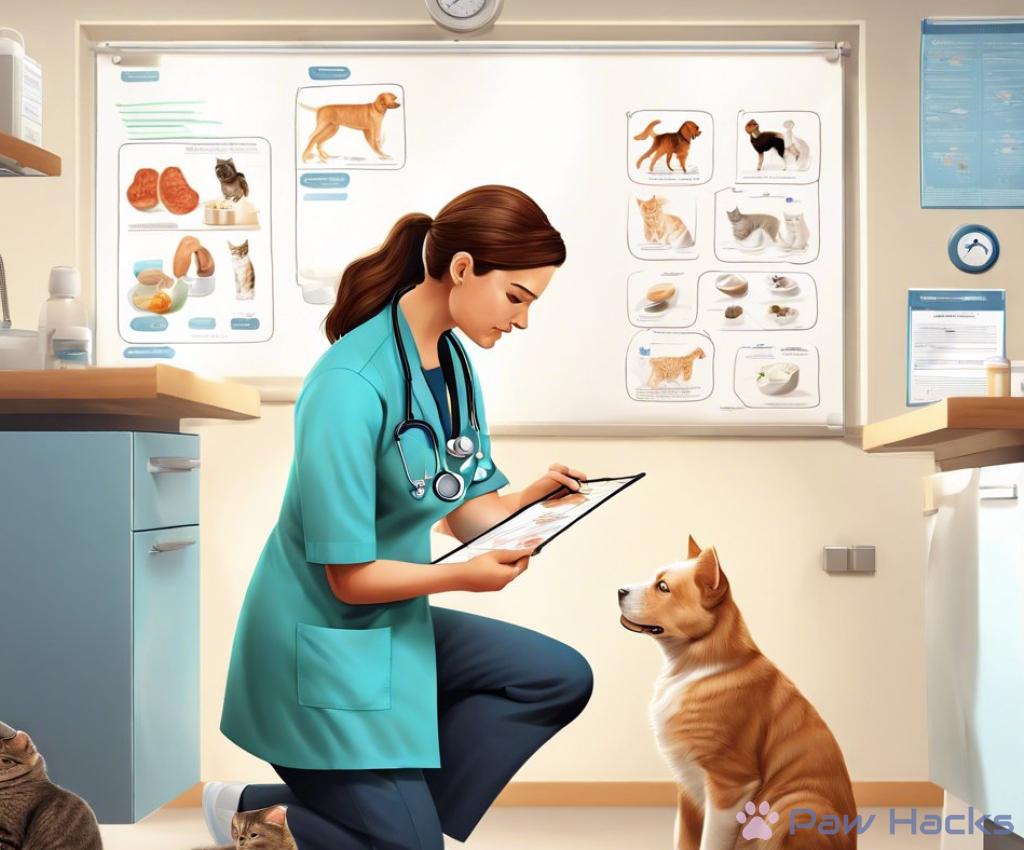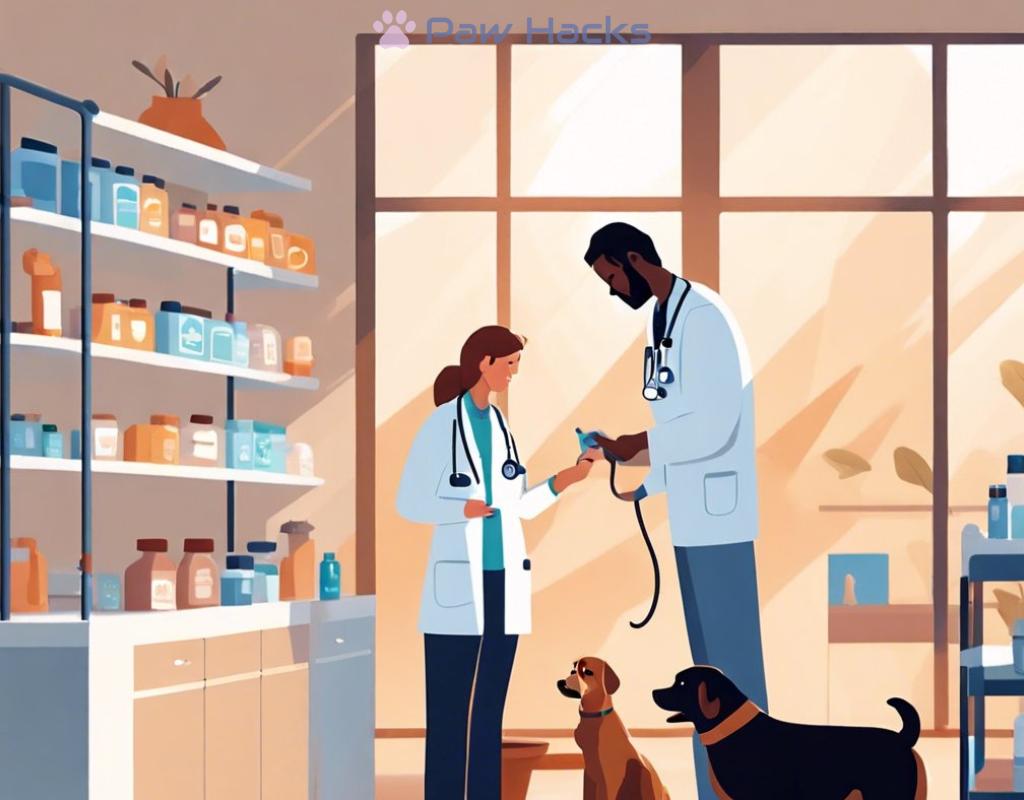Managing Chronic Diarrhea in Pets
Understanding the Causes of Chronic Diarrhea in Pets

The Many Faces of Chronic Diarrhea
Chronic diarrhea in pets is not just an inconvenience; it can signal underlying health issues that warrant immediate attention. Understanding the various causes can help pet owners make informed decisions and seek timely veterinary care. This article aims to shed light on the potential culprits behind this troubling condition.
Common Causes of Chronic Diarrhea
Several factors can contribute to chronic diarrhea in pets. Identifying these causes is crucial for effective management and treatment. Below is a comprehensive list of some common causes:
- Dietary indiscretion: Pets often consume things they shouldn’t, leading to gastrointestinal upset.
- Food allergies or intolerances: Certain ingredients in pet food can cause adverse reactions.
- Infections: Bacterial, viral, or parasitic infections can disrupt normal digestion.
- Inflammatory bowel disease (IBD): A chronic condition characterized by inflammation of the gastrointestinal tract.
- Pancreatitis: Inflammation of the pancreas can lead to digestive issues.
- Medications: Some drugs may cause gastrointestinal side effects.
- Stress: Just like humans, pets can experience stress, which can manifest as diarrhea.
When to Seek Veterinary Help
It’s essential to monitor your pet’s health closely. If you notice persistent diarrhea that lasts more than a day or two, it’s time to consult a veterinarian. Along with diarrhea, if your pet experiences other symptoms such as vomiting, lethargy, or loss of appetite, these can be signs of a more serious issue. Early intervention can make a significant difference in your pet’s health and recovery.
Effective Home Remedies for Managing Diarrhea in Your Furry Friend

Chronic diarrhea in pets can be distressing for both animals and their owners. While veterinary care is essential for diagnosing underlying issues, there are also effective home remedies that can help manage diarrhea and promote recovery. These remedies may provide comfort and alleviate symptoms, allowing your furry friend to feel better while you seek professional advice.
Natural Ingredients for Relief
Incorporating natural ingredients into your pet’s diet can be beneficial in managing diarrhea. One of the most popular remedies is plain, unsweetened pumpkin puree, which is rich in fiber. This ingredient can help firm up loose stools and is gentle on the digestive system. You can mix a small amount into your pet’s food. Another effective option is boiled chicken and rice. This bland diet is easy to digest and can help soothe the gastrointestinal tract. It’s important to ensure that the chicken is skinless and boneless to avoid any potential complications.
Hydration is Key
When dealing with diarrhea, hydration becomes a top priority. Pets can quickly become dehydrated due to fluid loss, so providing them with fresh water is crucial. Additionally, offering an electrolyte solution formulated for pets can help replenish lost minerals and support recovery. You may also consider adding low-sodium broth to their diet, which can encourage drinking while providing essential nutrients.
While home remedies can soothe symptoms, they are not a substitute for veterinary care. Always monitor your pet’s condition closely. If diarrhea persists or is accompanied by more severe symptoms, such as blood in the stool or extreme lethargy, consult your veterinarian immediately. By combining home care with professional advice, you can help your furry friend recover more comfortably.
When to Seek Veterinary Help for Your Pet’s Diarrhea
Chronic diarrhea can be a distressing experience for both pets and their owners. Understanding when to seek veterinary help is crucial for ensuring your pet’s health and well-being. While occasional digestive upset is common, persistent symptoms can indicate serious underlying issues that require professional evaluation.
Timing Matters: If your pet has diarrhea that lasts longer than 48 hours, it’s essential to reach out to your veterinarian. Prolonged diarrhea can lead to dehydration and other complications, making timely intervention critical. Moreover, if you observe any accompanying symptoms such as vomiting, a change in appetite, or unusual lethargy, do not hesitate to schedule a vet visit.
Assessing Severity: Pay attention to the consistency and color of your pet’s stool. Diarrhea that is watery or contains blood is especially concerning and should prompt immediate veterinary attention. Additionally, if your pet shows signs of discomfort, such as whining, excessive grooming, or hiding, these behaviors can indicate that they are experiencing more than just a minor stomach upset.
While diarrhea itself is a significant concern, it often accompanies other symptoms that can provide insights into your pet’s health. Identifying these symptoms early can help your veterinarian make a timely diagnosis and treatment plan.
Comprehensive Assessment: Look for symptoms such as fever, which can indicate an infection or systemic illness. A sudden increase in thirst or urination may signal dehydration or kidney issues. Furthermore, if your pet’s behavior changes dramatically—becoming more withdrawn or aggressive—it’s a sign that something may be seriously wrong.
Age and Health Conditions Matter: Puppies and senior pets are particularly vulnerable. Young pets may be at risk for rapid dehydration, while older pets may have pre-existing conditions that complicate diarrhea. If your pet falls into one of these categories, err on the side of caution and consult your veterinarian sooner rather than later.
Nutritional Solutions: Best Diets for Pets with Chronic Diarrhea
Navigating Dietary Options for Digestive Health
When dealing with chronic diarrhea in pets, diet plays a pivotal role in managing symptoms and promoting overall health. Choosing the right food can be crucial not only for alleviating diarrhea but also for ensuring your furry friend receives all the essential nutrients they need. A well-balanced diet tailored to your pet’s specific needs can aid in recovery and prevent future gastrointestinal flare-ups.
It’s vital to consult with your veterinarian before making any dietary changes. They can help identify the underlying cause of diarrhea and recommend the best nutritional strategies. In this guide, we will explore the most effective dietary solutions for pets suffering from chronic diarrhea, focusing on key ingredients and food types that support digestive health.
Key Ingredients That Aid Digestion
When selecting food for pets with chronic diarrhea, certain ingredients can provide significant benefits. For instance, highly digestible proteins such as chicken or turkey are easy on the stomach and help in muscle maintenance. In addition, complex carbohydrates like sweet potatoes or brown rice can be gentle on the digestive tract while providing energy.
Another essential component is soluble fiber. Ingredients like pumpkin or psyllium husk can help absorb excess water in the intestines, leading to firmer stools. Furthermore, probiotics are beneficial bacteria that can restore gut flora balance, improving digestion and overall gut health. Many specialty pet foods now include these live cultures.
| Ingredient | Benefits |
|---|---|
| Highly Digestible Proteins | Easily absorbed, helps maintain muscle mass |
| Complex Carbohydrates | Gentle on the stomach, provides energy |
| Soluble Fiber | Helps firm stools, absorbs excess water |
| Probiotics | Restores gut flora balance, aids digestion |
Choosing the Right Food Type
When it comes to food types, consider prescription diets specifically formulated for gastrointestinal health. These diets are designed to meet the unique needs of pets with digestive issues. Many brands offer hydrolyzed protein formulas, which break down proteins into smaller components that are less likely to provoke an immune response or irritation in sensitive pets.
Alternatively, homemade diets can be tailored to your pet’s specific needs, but they should be balanced and include all necessary nutrients. Always work with a veterinarian or a pet nutritionist to ensure that homemade meals are suitable for your pet’s condition. Additionally, incremental feeding is advisable. Gradually introducing new food over several days can help minimize digestive upset.
Ultimately, the right diet for your pet can make a remarkable difference in managing chronic diarrhea. By focusing on easily digestible ingredients and ensuring a balanced diet, you can significantly improve your pet’s quality of life and enhance their overall health.
Preventive Measures: Keeping Your Pet’s Digestive Health in Check
Maintaining your pet’s digestive health is crucial in preventing chronic diarrhea. Just as a well-balanced diet and proper hydration are vital, proactive strategies can significantly reduce the risk of gastrointestinal issues. By implementing a few simple yet effective measures, you can help ensure that your furry friend leads a healthy and happy life, free from the discomfort of digestive disturbances.
Balanced Diet: The Foundation of Good Health
A key factor in preventing chronic diarrhea is providing a nutritionally balanced diet. Opt for high-quality pet food that meets your pet’s specific dietary needs, taking into account their age, breed, and health conditions. It is essential to avoid sudden changes in their diet, as this can upset their digestive system. When introducing new food, do so gradually, mixing it with their current food over several days. This cautious approach allows your pet’s digestive tract to adjust without unnecessary stress.
Regular Vet Check-ups: Staying Ahead of Problems
Routine veterinary visits play a vital role in monitoring your pet’s overall health, including their digestive well-being. Regular check-ups can help identify potential issues before they escalate. During these visits, discuss any concerns you may have regarding your pet’s digestion and inquire about appropriate preventive measures tailored to their needs. A veterinarian can offer advice on vaccinations, parasite control, and nutrition, all of which contribute to maintaining a healthy gut.
Stress Management: The Overlooked Factor
Stress can be a significant contributor to digestive disorders, including chronic diarrhea. Ensuring a stable and calm environment for your pet is essential. Provide them with a safe space where they can retreat and relax. Incorporating regular exercise and mental stimulation can also reduce stress levels. Activities such as walks, playtime, and interactive toys can keep your pet engaged and happy, promoting a healthier digestive system.
Share this content:



